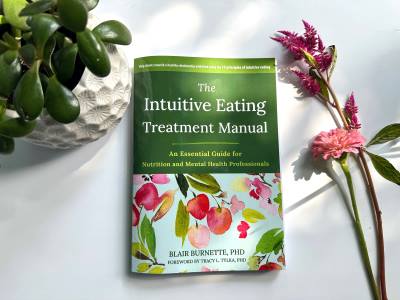Dr. Blair Burnette releases new book on intuitive eating treatment
September 1, 2024 - Shelly DeJong
 Dr. Blair Burnette, assistant professor in the MSU Department of Psychology, released her new book, The Intuitive Eating Treatment Manual, on September 1, 2024. Intuitive eating is an anti-diet approach to nutrition that emphasizes eating guided by hunger and fullness cues. Burnette’s guide is structured around the 10 principles of intuitive eating and provides a comprehensive manual for psychotherapists, dieticians, nutritionists, and researchers session-by-session techniques to effectively teach others how to implement the core values of intuitive eating, and also promote a healthy and nourishing relationship to food.
Dr. Blair Burnette, assistant professor in the MSU Department of Psychology, released her new book, The Intuitive Eating Treatment Manual, on September 1, 2024. Intuitive eating is an anti-diet approach to nutrition that emphasizes eating guided by hunger and fullness cues. Burnette’s guide is structured around the 10 principles of intuitive eating and provides a comprehensive manual for psychotherapists, dieticians, nutritionists, and researchers session-by-session techniques to effectively teach others how to implement the core values of intuitive eating, and also promote a healthy and nourishing relationship to food.
We recently talked with Dr. Burnette about her reasons behind writing this book, why intuitive eating is popular right now, and much more.
Why do you think there is such an interest in intuitive eating?
People are so tired of diet culture. If you think about it, nutrition advice is so conflicting. There's the carnivore diet, which is only animal-based, and then there are plant-based diets, which are entirely plant-based, and both are supposed to be healthy. On the internet, there are always new trends promising people they will change their lives, yet people struggle to stick to them because they go against our biology. We haven't evolved to deprive ourselves of food when it's available. Having super restrictive diets that aren't realistic for most people's lives just sets people up to fail and feel bad about themselves. This approach offers a new way where you get to listen to your body and work with your own internal needs. I believe this is a more empowering approach. You don't have to hate your body or constantly try to change it or fight against it. Your body is your home, and you can appreciate it. This doesn't feel punishing like diet culture does.
Intuitive eating teaches people a new way of connecting with food and their bodies that is much more sustainable in the long run. There's tremendous societal pressure to conform to a certain body type and appearance. Our culture often stigmatizes people based on their size, leading us to internalize beliefs that larger bodies are bad and smaller bodies are good. This framework really helps people build a defense against this way of thinking, and it enables them to eat according to their individual needs.
 Why did you want to write this book?
Why did you want to write this book?
There is a significant amount of research on the benefits of intuitive eating, but there is a lack of accessible and inclusive eating intervention guides for professionals. If you search for "intuitive eating class" or "intuitive eating group" on Google, you will find hundreds of results, but it's unclear what training the leaders have had in intuitive eating. It's concerning that some professionals seem to be co-opting intuitive eating language. For example, Gwyneth Paltrow came out with something called "intuitive fasting," and there was also an article about "intuitive tracking." These are essentially the opposite of intuitive eating.
I wanted to write this manual to help put training and factual information into the hands of more people and provide a standardized blueprint for practitioners who struggle to find comprehensive training. I also aimed to address the lack of structured intervention research in intuitive eating by creating a treatment manual that can be used in both individual and group settings. The manual includes guided scripts for guided self-help and offers flexibility in the number of sessions based on different timelines. The book also includes many free online tools like exercises and worksheets for readers.
I hope that this book makes intuitive eating accessible to more people. The more clinicians who can use a standardized treatment manual, the more people will have access to high-quality intuitive eating counseling and research. That's my goal.
How is a psychology approach to intuitive eating helpful?
Intuitive eating is not giving someone a meal plan. Intuitive eating is more about the psychology of eating. Almost every principle revolves around that, with less focus on the specific foods consumed and more on how they feel in the body, energy levels, and digestion. Eating is inherently psychological, especially in a culture obsessed with diets and body image, which can lead to a contentious relationship with food. Therefore, I believe intuitive eating is more about the psychological dimension than the nutritional one.
Is it helpful for people who are interested in intuitive eating to have a professional help guide them?
As humans, we generally like having rules and guidelines, especially when it comes to our eating habits. However, most of us struggle to stick to diets long term. People may not even be aware of the numerous food rules and beliefs they've adopted without examination. Intuitive eating involves questioning these beliefs and determining if they still serve us. In our culture, there's a lot of pressure to lose weight and follow strict eating guidelines, making it challenging to move towards intuitive eating without support. The acceptance model of intuitive eating suggests that having a supportive social environment fosters intuitive eating. It's essential to have people around you who understand and support your approach to eating. In today's culture, starting a diet seems much easier than learning to listen to and care for your body.
Is there anything else that you want to mention?
Intuitive eating is sometimes criticized as a privileged approach – which is a criticism with merit AND I think reflects some misunderstanding of intuitive eating. If you view it as the hunger and fullness diet or think intuitive eating means eating whatever you want when you want, it'd be easy to understand why not everyone can do that. It is true that intuitive eating is harder for folks with fewer resources and who may be experiencing food insecurity. Accordingly, my research interrogates what social, cultural, and environmental factors facilitate and hinder intuitive eating. However, I also think we could improve our framing of intuitive eating so that it feels more accessible for folks, which is what I tried to do in this book!
Intuitive eating has been criticized in the past as being written towards a very specific demographic – adult white women who engage in emotional eating. This guide aims to be much more inclusive, so people who might not have seen intuitive eating as an option in the past can now.
To pick up a copy The Intuitive Eating Treatment Manual, visit: https://www.newharbinger.com/9781648482540/the-intuitive-eating-treatment-manual/.

